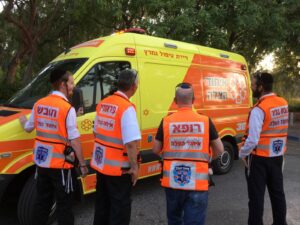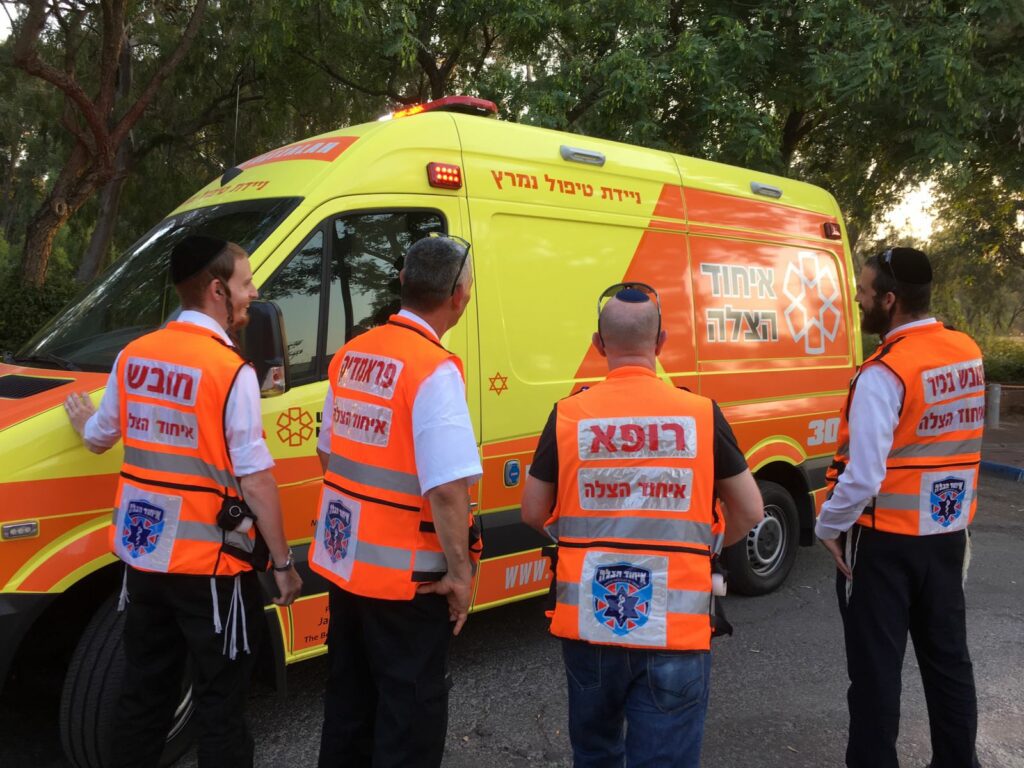Last Sunday evening just after 5:00 p.m., an 11-year-old girl was playing on a backyard trampoline in her home, located in the town of Karnei Shomron. The child was bouncing around with her siblings when she got off the trampoline and suddenly collapsed to the ground. The child’s mother noticed her unconscious child and frantically called United Hatzalah’s Dispatch and Command Center.
Two United Hatzalah EMT volunteers, who wish to remain anonymous, were the first to arrive on the scene. It took them less than 90 seconds to arrive at the girl’s side and begin treatment. The first responders quickly checked the unconscious child’s vital signs and then attached a defibrillator and began performing CPR. The defibrillator recommended admitting a shock. The EMT’s paused compressions and administered two shocks to the still unconscious girl.
After the second shock, a doctor and a paramedic who volunteer with United Hatzalah arrived as did a mobile intensive care ambulance (MICU) team. The paramedic was Oren Adi. The child’s mother told Adi that the girl has a history of heart problems, which immediately raised a red flag and caused the first responders to question whether this was a case of an injury or a recurring health issue. Adi attached a cardiac monitor with the help of the team from the MICU and was surprised to find that the victim had a pulse.
Unconscious and breathing, the 11-year-old was transferred to the nearest hospital, showing positive signs. As the ambulance and the medical crew cleared the scene, the operational head of the Psychotrauma and Crisis Response Unit, Hadas Rucham arrived at the house to provide assistance to the traumatized father and other children. Hadas spoke to the father, calming him down after the accident that had just unfolded before him, and suggested that he be driven to the hospital to meet his wife and child, while a neighbor looks after the rest of the children. She then turned to the eldest boy, a 9-year-old, and helped him sort through his emotions as he also witnessed his sister’s collapse.
At the hospital, the doctors were struggling to discover the origin of the incident and decided that they needed information from the defibrillator that the first responders used on the girl, which was still in Karnei Shomron. A nearby volunteer ambucycle driver, Yehuda Haas, was alerted and asked to transfer the defibrillator to a United Hatzalah Employee who could download the data from the defibrillator. Yehuda raced on his ambucycle to Petah Tikva to deliver the defibrillator. After successfully downloading the data, it was sent to the medical staff in the hospital. With the information provided by the defibrillator, it was later concluded that the cause of the accident was indeed a heart problem and not an injury.
“There’s something special about seeing everyone working together harmoniously to save the girl’s life.” Adi commented. “Between the two first responders, the doctors, the MICU members, Hadas from the Psychotrauma Unit, Yehuda delivering the defibrillator and the man who downloaded the data, we were a full team of medical personnel, all providing medical care and working together to do so. This participation and togetherness are heartwarming. All the volunteers were devoted to their work and we ended up saving a life.”
Adi and the crew were later informed that night that the 11-year-old girl tested positive for Covid-19, causing all the medical personnel involved to quarantine immediately.
“The beautiful thing about volunteering is that if we would have known that the victim was a Coronavirus patient, that would not prevent us from doing everything necessary to helping her,” Adi added. “As a United Hatzalah volunteer, I know what is right and what I have to do, no matter the possible risk. We saved a life that day, and I would do it again in a heartbeat, even knowing the risk.”













One Response
“We saved a life that day, and I would do it again in a heartbeat, even knowing the risk.”
Mi K’amcha Yisrael